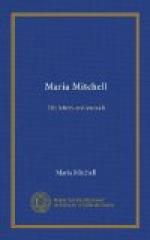“The whole staff of the observatory consists of Professor Smyth, Mr. Wallace, an old man, and Mr. Williamson, a young man.
“The city of Edinboro’ has no amateur astronomers, and there are two only, of note, in Scotland: Sir William Bisbane and Sir William Keith Murray.
“From the observatory, the view of Edinboro’ is lovely. ‘Auld Reekie,’ as the Scotch call it, always looks her best through a mist, and a Scotch mist is not a rare event—so we saw the city under its most becoming veil.
“October, 1857. I stopped in Glasgow a few hours, and went to the observatory, which is also the private residence of Professor Nichol. Miss Nichol received me, and was a very pleasant, blue-eyed young lady.
“I found that the observatory boasts of two good instruments: a meridian circle, which must be good, from its appearance, and a Newtonian telescope, differently mounted from any I had seen; cased in a composition tube which is painted bright blue—rather a striking object. The iron mounting seemed to me good. It was of the German kind, but modified. It seemed to me that it could be used for observations far from the meridian. The iron part was hollow, so that the clock was inside, as was the azimuth circle, and thus space was saved.
“They have a wind and rain self-register, and a self-registering barometer, marking on a cylinder turned by a clock, the paper revolving once an hour.
“When I was at Dungeon Ghyll, a little ravine among the English lakes, down which trickles an exceedingly small stream of water, but which is, nevertheless, very picturesque,—as I followed the old man who shows it for a sixpence, he asked if we had come a long way. ‘From America,’ I replied. ‘We have many Americans here,’ said he; ’it is much easier to understand their language than that of other foreigners; they speak very good English, better than the French or Germans.’
“I felt myself a little annoyed and a good deal amused. I supposed that I spoke the language that Addison wrote, and here was a Westmoreland guide, speaking a dialect which I translated into English before I could understand it, complimenting me upon my ability to speak my own tongue.
“I learned afterwards, as I journeyed on, to expect no appreciation of my country or its people. The English are strangely deficient in curiosity. I can scarcely imagine an Englishwoman a gossip.
“I found among all classes a knowledge of the extent of America; by the better classes its geography was understood, and its physical peculiarities. One astronomer had bound the scientific papers from America in green morocco, as typical of a country covered by forests. Among the most intelligent men whom I met I found an appreciation of the different characters of the States. Everywhere Massachusetts was honored; everywhere I met the horror of the honest Englishman at the slave system; but anything like a discriminating




